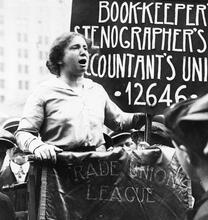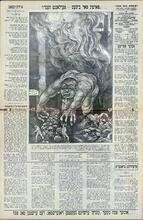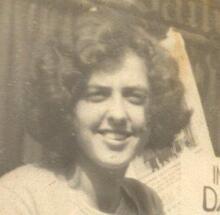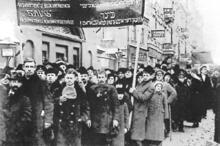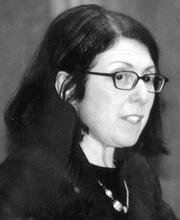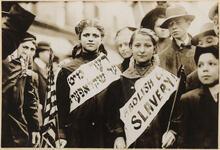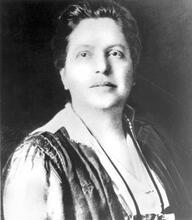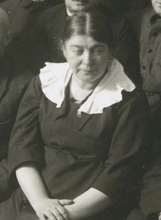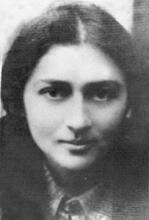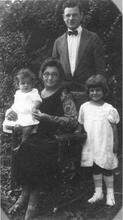Evelyne Serfaty
Evelyne Serfaty was one of the most active women in the Moroccan Communist Party. After being expelled from high school based on anti-Semitic Vichy legislation, Evelyne, together with her brother Abraham, was radicalized into joining the Youth Communists in Morocco, and they militated for Moroccan independence from French and Spanish colonial rule. Under the authoritarian oppression that followed Moroccan independence, they continued their clandestine activities with the Moroccan Communist Party and the Party of Liberation and Socialism. Evelyne was kidnapped and tortured for her brother’s political activities in the early 1970s under Morocco’s post-independence authoritarian state.
Introduction
Evelyne Serfaty was born to a comfortable Casablancan family with roots in the northern Moroccan city of Tangier. Her exact birthdate is unknown, but it is likely to be in the 1920s. Her brother, Abraham Serfaty, born in 1926, was more famous than his sister for his outspoken political activism and years in prison; nearly all available information about Evelyne comes through sources related to him. Evelyne died in 1974, two years after being picked up off the streets of Rabat and brutally tortured for information on the whereabouts of her brother, who was in hiding at the time. What has gone under-appreciated, however, is that Evelyne Serfaty, described by Abraham as “small and frail,” was a Communist militant in her own right, one of a handful of Moroccan Jewish women who fought for Moroccan independence from French and Spanish colonial rule and then became a martyr for far-left politics under the post-independence authoritarian regime.
Early Years
Evelyne Serfaty’s father was an anti-Zionist Jew from Tangier who spent part of his youth working in Brazil before ultimately returning home to Morocco. The Serfaty siblings, Evelyne and Abraham, likely inherited their own anti-Zionism and political verve from their father. Like many Moroccans, the Serfaty patriarch moved to Casablanca in the early twentieth century to take advantage of new employment opportunities afforded by the recent French investment in that town, a process that had begun even before the formal declaration of the French protectorate over Morocco in 1912 (the Spanish maintained a smaller protectorate in the north of the country, while Tangier became an international zone). It is unclear whether Serfaty père met and married prior to arrival in Casablanca, and it is unclear where Evelyne was born, although we do know that Abraham was born in Casablanca, making it Evelyne’s likely birthplace as well. Interwar Casablanca was a city buzzing with industry and ideological ferment, including among Spanish and French communists, which had an outsized influence on the Serfaty siblings’ political development.
After falling to invading Nazi forces early in the summer of 1940, France was divided into the German occupied zone, including Paris, and the southern unoccupied zone with its capital at Vichy. The city, previously more famous for its healing spa waters, lent its name to the collaborationist French regime that took shape under Marshal Phillipe Pétain. In France and in French colonies, anti-Semitic Vichy legislation was enacted, including quotas on Jews in state educational institutions. Evelyne Serfaty was expelled from high school based on this legislation, while Abraham was able to remain in school as part of the Jewish quota. After the Allied landings in French North Africa in Operation Torch in November 1942, the worst of the Vichy regime began to be rolled back, although not as quickly as some would like. The experience of Vichy, plus previous exposure to Spanish and French communists, radicalized the Serfaty siblings into joining the Youth Communists in Morocco.
Anti-Colonial Struggle and Post-Independence Authoritarianism
From the late 1940s into the early 1950s, both Serfaty siblings appeared in French protectorate surveillance reports of the Moroccan Communist Party (MCP). By 1946, after some initial reticence, the party had embraced a national liberation platform from French and Spanish colonial rule. As part of the MCP, the young radicals distributed leaflets, pasted propaganda on walls, attended MCP meetings and protests, and transported their comrades. The Serfaty siblings were deeply involved in the MCP’s activities, and for this the French government expelled them to France in 1952 on the pretext that they were actually Brazilian citizens, based on their father’s years working in that country. In France, the police could even more closely monitor the siblings. When Morocco achieved its independence in 1956, both siblings returned to their homeland, amid a moment of post-independence euphoria for all Moroccans, including Jews. While approximately 90,000 Jews had migrated to Israel between 1948 and 1956, the rate of migration now slowed considerably.
Post-independence euphoria soon gave way to authoritarian oppression, particularly under the rule of King Hassan II (r. 1961-1999). The Moroccan Communist Party was outlawed in 1959 under the previous king, Mohammed V, then reemerged as the Party of Liberation and Socialism (PLS) before being outlawed once again in 1969. Throughout this period, both Serfaty siblings engaged in clandestine activities with the MCP turned PLS. Abraham Serfaty broke with the PLS in 1969, turning to co-found the Marxist-Leninist party Ila al-Amam (Forward, in Arabic). In his role in Ila al-Amam and his outspoken support for the Polisario front, the national independence organization of Western Sahara, Abraham Serfaty ran afoul state authorities. He was arrested briefly in 1972 before going into hiding.
Kidnapping and Torture
In the effort to get information about her brother’s location, the Moroccan police abducted Evelyne Serfaty off the street during a shopping trip to the capital city of Rabat. When she was asked about her brother’s whereabouts, she did not answer. In truth, she did not know. She was then subjected to torture, including the “parrot perch” method of being tied dangling to a pole and waterboarded with bleach mixed into water. Evelyne was tortured in this manner for days, enduring threats not only to herself but also to her elderly parents. At one juncture she was blindfolded and told that she would be “thrown into the sea” after first “closing [her] in a sack,” only to be returned to her cell. She was finally released after nearly a week of this treatment and drove herself home to Casablanca, battered, bruised, and “barely able to walk” (Serfaty, Le Maroc, 13-14, translation by author).
Evelyne Serfaty died in 1974 of hepatitis, which Abraham later maintained was a direct result of her torture. Abraham Serfaty was arrested again in the same year and was not released from prison until the early 1990s.
Conclusion
What often is missed in the tale of Evelyne Serfaty’s martyrdom for her brother is the fact that she had been a leftist political firebrand in her own right, active in particular during Morocco’s struggle for national liberation. Hers is often the only woman’s name that comes up in police surveillance reports of leftist activity, and her signature was often the only woman’s on leftist Jewish petitions beseeching the community not to listen to Zionist propaganda. And yet, she is most remembered for her martyrdom for her brother.
Serfaty, Abraham. Le Maroc, du noir au gris. Paris: Éditions Syllepse, 1998.
Serfaty, Abraham and Mikhaël El Baz, L’insoumis: Juifs, Marocains et rebelles. Paris: Desclée de Brouwer, 2001.
Heckman, Alma Rachel. The Sultan’s Communists: Moroccan Jews and the Politics of Belonging. Stanford: Stanford University Press, 2021.

